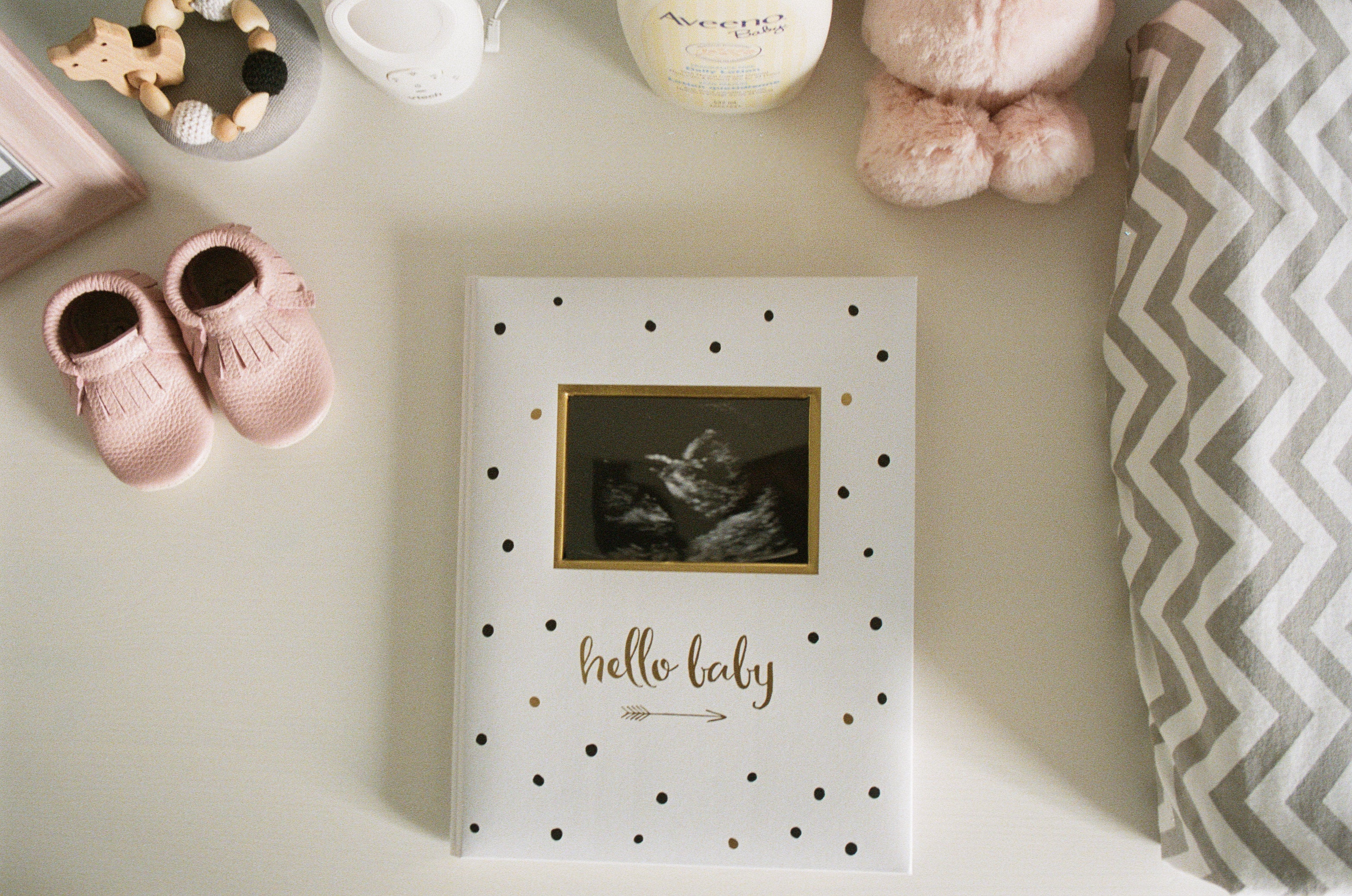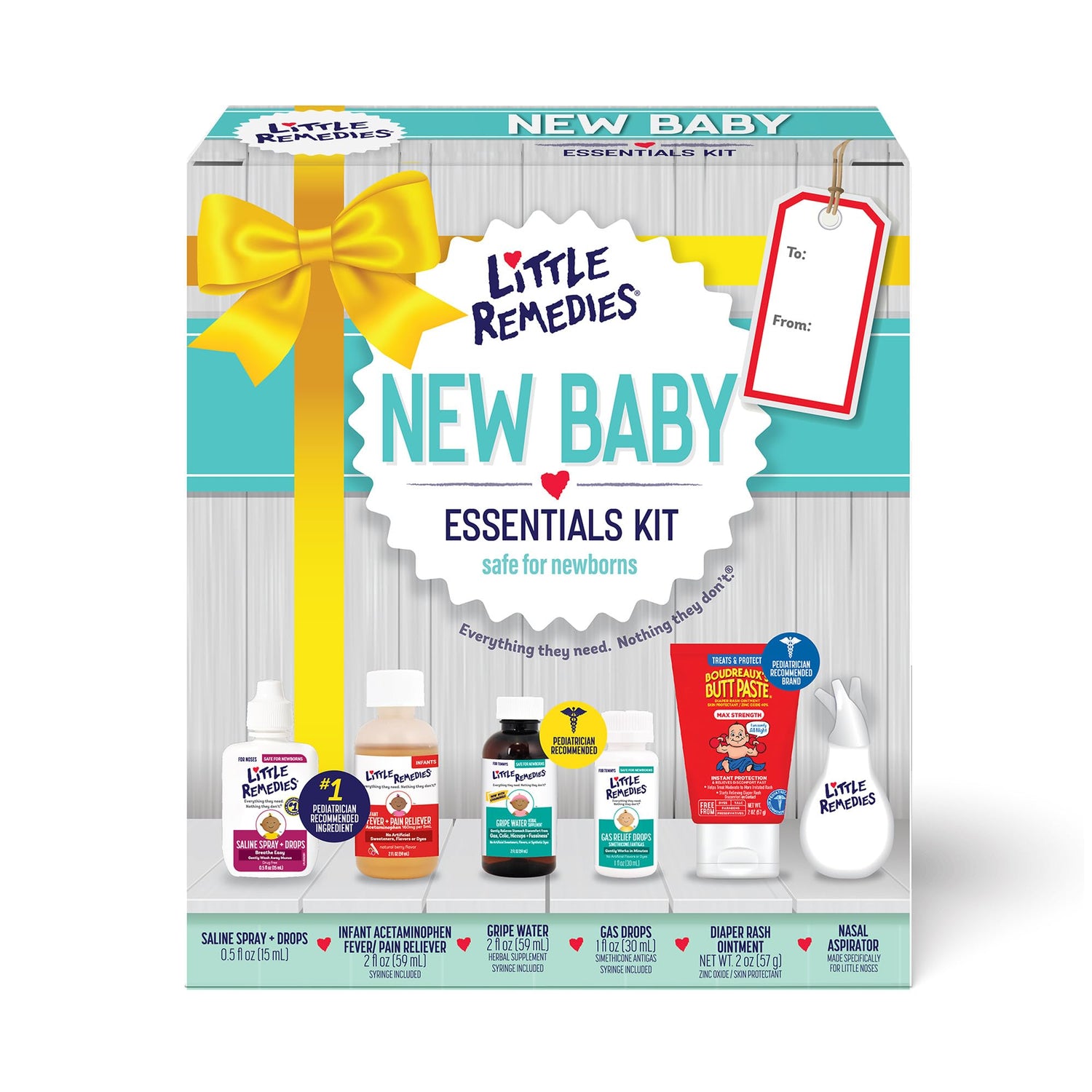
Learn The Basics
Caring for a newborn can be exhausting, and it’s essential for parents to look after themselves as well. Accepting help, resting when possible, and practicing patience with yourself makes the journey more manageable. Ultimately, the newborn stage—though demanding—is a special time of bonding, learning, and setting the stage for a lifetime of love and connection.

New Baby Care kit
The Little Remedies New Baby Essentials Kit is designed to make caring for your newborn a little easier, especially in those first few months when common discomforts pop up. It includes safe, gentle solutions for everyday challenges—like saline spray for stuffy noses, gripe water and gas drops for tummy troubles, pain reliever for fevers, diaper rash ointment, and a nasal aspirator. Each item is made with newborns in mind, giving dads peace of mind that they have the right tools on hand when their baby needs quick relief. Compact and practical, this kit is a great go-to set for new fathers who want to feel prepared and confident in caring for their little one.
New Baby Guide for Dads
Becoming a dad is one of life’s biggest adventures. While plenty of books and blogs focus on moms, dads play an equally important role in the early days of a baby’s life. Here’s a quick guide to help you step confidently into fatherhood.
1. Be Present From Day One
Your baby won’t remember who changed the first diaper or rocked them at 2 a.m.—but you will. Jump in and share those moments. Every feed, burp, cuddle, and diaper is a chance to bond.
2. Support Your Partner
The first few weeks are intense. Simple things—making a meal, running errands, or just listening—go a long way in supporting your partner while she recovers and adjusts.
3. Learn the Basics
- Diaper Duty: Practice makes perfect.
- Bath Time: Babies are slippery—slow and steady wins.
- Soothing: Swaddling, rocking, and skin-to-skin are powerful tools.
4. Balance Work and Home
If you’re returning to work, set aside special time just for your baby when you’re home. Even 30 minutes of focused play or snuggles builds a strong connection.
5. Take Care of Yourself Too
Parenting is demanding. Rest when you can, eat well, and don’t be afraid to ask for help. A healthier you means a better dad.
6. Build Your Own Bond
You don’t have to parent exactly like your partner. Sing your favorite songs, take baby for stroller walks, or read them bedtime stories. Your unique bond is just as important.

Basic Bonding
Bonding with your newborn happens through everyday moments like holding, skin-to-skin contact, feeding, strolling on a walk, and gentle interaction. These simple acts build trust, security, and love—forming the foundation for a strong lifelong relationship between parent and child.
Late Night Crying
Late-night crying is one of the most common—and often the most challenging—parts of caring for a newborn. In the first few months, babies wake frequently through the night because their tiny stomachs can only hold small amounts of milk at a time, meaning they need to feed often. Crying is their way of communicating hunger, discomfort, or the need for closeness, and while it can be exhausting for parents, it is also completely normal.
For many newborns, nighttime crying is not just about hunger—it can also signal the need for a diaper change, soothing from gas or colic, or simply the comfort of being held. The unpredictability of these cries can leave parents feeling unsure, but over time you’ll begin to notice patterns in your baby’s signals, making it easier to respond.
Soothing strategies like gentle rocking, swaddling, skin-to-skin contact, stroller walks during the day, and white noise can all help calm a fussy baby at night. Taking turns with your partner, preparing nighttime supplies in advance, and creating a calming bedtime routine can also make nights more manageable.
Equally important is caring for yourself as a parent. Sleepless nights can feel draining, but reminding yourself that this phase is temporary can help you cope. If crying ever feels overwhelming, it’s okay to place your baby safely in their crib and take a short break to breathe and reset. Trust your instincts, and if crying seems unusual—such as intense, inconsolable, or accompanied by illness—don’t hesitate to contact your pediatrician.
Ultimately, late-night crying is part of a newborn’s adjustment to life outside the womb. Responding with patience and comfort not only soothes your baby but also builds trust and strengthens the bond between you. With time, as your baby grows and their sleep patterns mature, those long nights will gradually become easier, leaving you with the memory of how much you were there for your little one in their earliest days.

Bath Time
Bath time is more than just keeping your newborn clean—it’s a special bonding opportunity for dads. In the early weeks, sponge baths are best until the umbilical cord heals, and later, gentle warm-water baths with a soft washcloth will become part of your routine. Holding your baby securely, speaking softly, and keeping eye contact during bath time helps them feel safe while strengthening your connection. With patience and practice, dads can turn bath time into a calming, enjoyable ritual that builds confidence for both parent and child.
Feeding Time
Feeding time is one of the most important parts of caring for your newborn, and it offers dads a powerful way to bond and build confidence in their parenting role. Whether your baby is breastfed, formula-fed, or a mix of both, your involvement during feeding helps create a sense of security, comfort, and closeness.
In the early weeks, babies typically eat every two to three hours, including throughout the night. While this can feel demanding, it’s also a natural rhythm that supports their rapid growth. For breastfeeding families, dads can play a vital role by bringing the baby to mom, helping with positioning, keeping mom hydrated, and stepping in afterward to burp and soothe the baby. For bottle-fed babies, dads can fully participate by preparing bottles, holding the baby close during feeds, and making eye contact to nurture emotional connection.
Feeding time is also about more than nutrition—it’s a chance to calm, comfort, and learn your baby’s cues. You’ll begin to notice the signs of hunger, like rooting or sucking motions, and the signs of fullness, such as turning away or slowing down. Paying attention to these signals builds your confidence and helps your baby feel understood.
Late-night feeds can be especially challenging, but they are also opportunities for dads to step in and share responsibility. Taking turns, preparing bottles in advance, or simply being present beside your partner helps make the nights more manageable for everyone.
Most importantly, feeding time gives dads a chance to connect on a deeper level. The simple act of holding your baby close, speaking softly, and providing comfort builds trust and strengthens the father-child bond. Over time, these small moments of care create a foundation of love and security that lasts far beyond the newborn stage.












